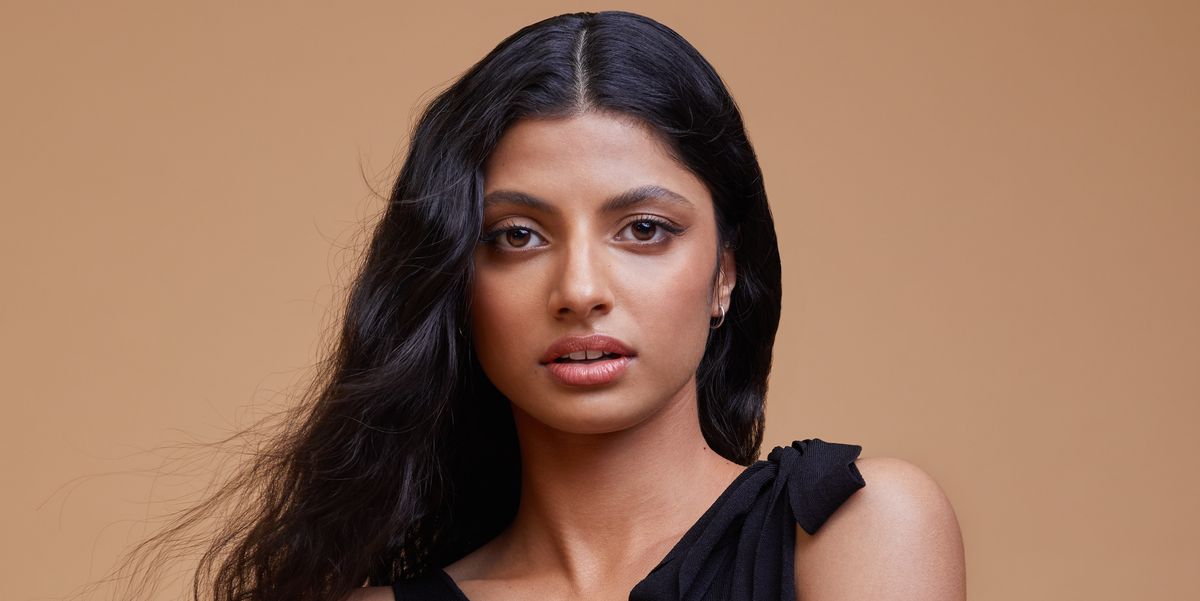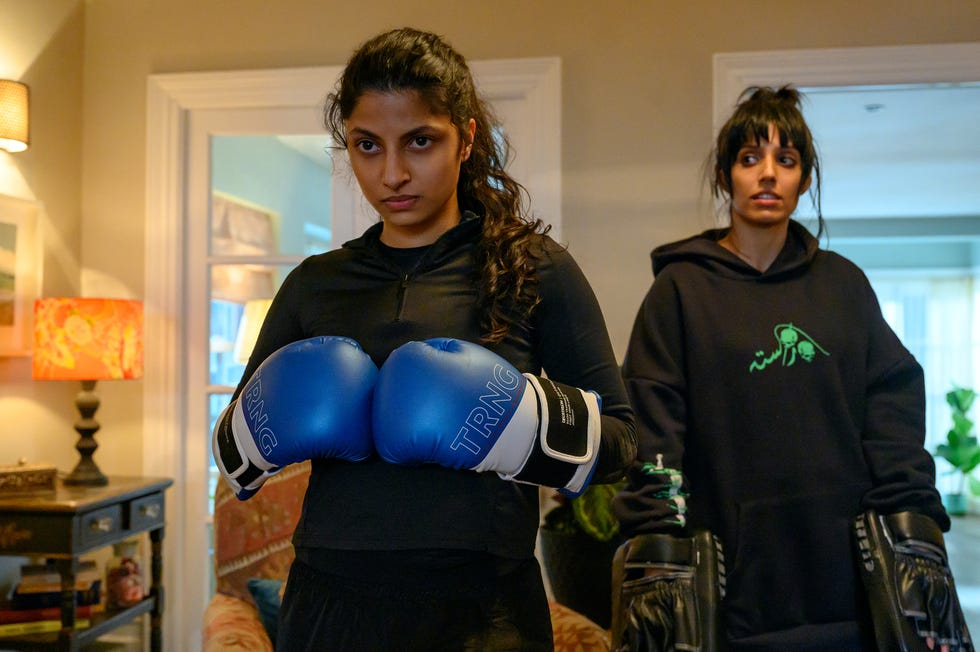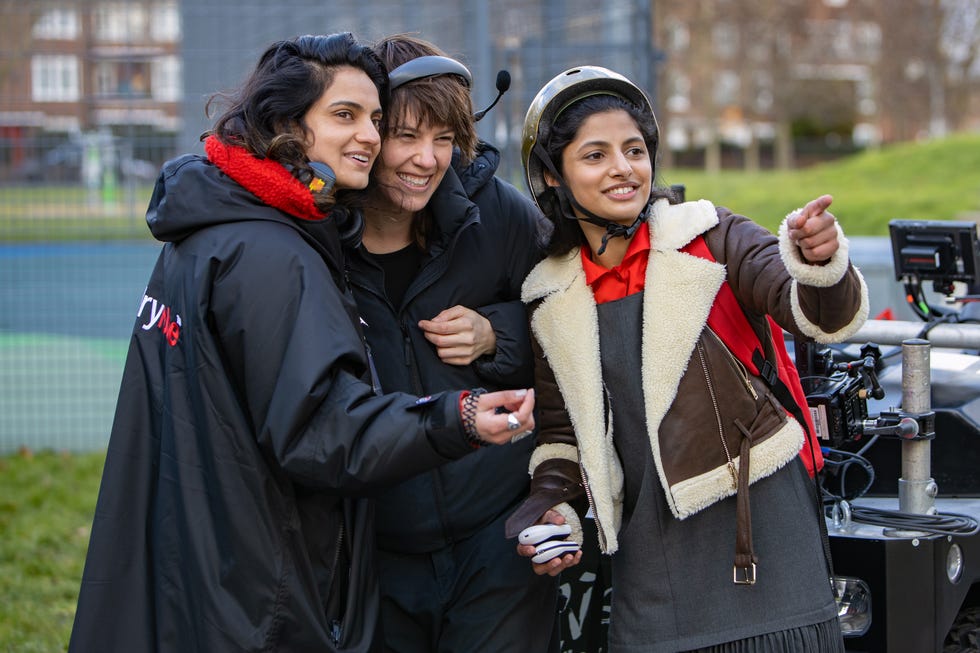Products You May Like
Two years ago, Priya Kansara knew it was time for a change. She was working in health care and pharmaceutical communications during the day and taking acting classes at night, then getting home for dinner around 10 P.M. Her work-side hustle balance was so skewed that, by the end, she was doing auditions when she said she was in meetings at work. “It was just madness…but there was not a single moment where I didn’t feel like I wasn’t doing what I wanted to be doing,” Kansara says via Zoom from her home in London.
That much-needed change happened when she took a leap and started pursuing acting full-time. Since then, she’s appeared in Bridgerton, Netflix’s The Bastard Son & The Devil Himself, and—her biggest role yet—the lead in Polite Society.
A 2023 Sundance pick and, frankly, one of the most enjoyable films of the year, the action-comedy romp directed by Nida Manzoor (We Are Lady Parts) stars Kansara as Ria, a Pakistani-British teen who dreams of becoming a stuntwoman despite her parents’ wishes for her to be a doctor and her community’s expectations for her to be a wife. When her older sister Lena (Umbrella Academy’s Ritu Arya) gives up her passion for art and gets engaged to eligible bachelor Salim (Akshay Khanna), Ria does everything she can to stop the wedding. It’s not just because of her protective sisterly instincts or the groom’s suspicious mother (Nimra Bucha)—there might be greater dangers at play.
Polite Society is high-energy and hilarious, with hints of Scott Pilgrim vs. the World in its hyperactive battle scenes and Bollywood influences throughout. It’s also a heartening coming-of-age story and a commentary on women’s bodily autonomy, all of which Manzoor meshes perfectly and Kansara portrays with ease and a natural comedic charm.
The actress originally auditioned for another part in Polite Society, but was asked to audition for Ria and meet with Manzoor at the Working Title production offices. (It was “honestly the most terrifying thing,” she recalls.) Kansara was invited back for a chemistry read, and the next day, she got the part. “I will never ever forget the feeling of getting that call. It was the best feeling in the whole world.”
Though the film had a whole stunt team and Kansara had her own double, she ended up doing a lot of her own action sequences. She got “to do some of the crazy things that I just never envisioned, like being on the wires and doing flips across walls and all the rest of it.” Mind you, Kansara had no prior experience in martial arts, fighting, or stunt training. “But it’s such a huge part of my character, so I knew that I wanted to really go and deep dive into it,” she says. “And it was such a huge part of me learning how to be Ria.”
Prep included fight training three times a week and learning martial arts techniques alongside the film’s combat choreography. She also had separate rehearsals for wire stunts, which included the flying reverse spin kick Ria tries to perfect throughout the movie. (“I am the fury!” she shouts before jumping into the move.) Like her character, Kansara and the stunt team took several tries to figure out her exact movements while being suspended mid-air. “I remember the first time I got my leg up in the air, and I managed to actually do a kick whilst flying in the air and I was like, ‘Oh my God, I did it!’ and then I got better and better until I was able to do it every time.”
Along with its delightfully wacky humor, Polite Society has been praised for its layered and nuanced representation of South Asian culture. Manzoor’s script also satirizes the pressures women face from society—and nosy aunties, let’s be honest—to settle down, marry “well,” and start producing children, nevermind their careers and non-domestic potential.
“I think Nida describes this so beautifully when she talks about it as well: it’s the small violences that women go through, and this film takes that and puts it…with very large extravagant violence, which is very physical,” Kansara says. “That’s a really fun way of being able to see that.” And audiences are loving it so far. “So many people have seen it, and they’ll be like, ‘The amount of times that I’ve wanted to kick an auntie in the face, and you guys did it.’”
Kansara personally related to the themes of “having to be the good girl, having to cater to what our society thinks is worth doing, to care what other people think,” which is why she was so drawn to her character. “One of the things that I just love so much about Ria is that she does not care what anybody thinks, and it’s just so empowering. I wish I’d seen something like this growing up because I certainly wasn’t that person.”
Polite Society is also, at its core, a sisterly love story, and Kansara and Arya sell it. The costars “clicked” and developed a sibling-like bond in real life. “It made everything feel so authentic and real, and it didn’t even feel like we were working at times,” says Kansara. Lena films Ria’s stunt YouTube videos without judgment, they have dance parties in the living room, and, of course, they fight. “The way that siblings fight, I swear to God it’s universal…our language between siblings is just so unique. She saw parts of Lena and Ria’s sisterhood in her own relationships with her younger brother and close cousins. “This is everything that I’ve witnessed in my life,” she says.
Kansara, who was born in London and is of Indian descent, doesn’t come from a showbiz family, which at first made her nervous to fully immerse herself in the acting world. “I don’t know anybody that’s in this industry, not from my background,” she says. “Nobody in the family is an actor or a musician or works in film or TV.” But her parents still nurtured her interest in film in their own ways, with her mother’s fandom for Bollywood movies and her dad’s love of action flicks. It’s no surprise they’re fully behind her acting journey, and are very excited about Polite Society. “I was so lucky to have everybody be so supportive in something that could otherwise have been absolutely terrifying,” Kansara says. “I think that’s why it’s so exciting for them, too—they’re learning something new as I am, and I get to share that with them.”
Kansara lives with her family, too, which she calls “very grounding.” She even apologizes for any background noise on our video call, expecting someone to barge into the background saying, “Priya, do you need this?!” Or, “Come and do the dishwasher!” or “something ridiculous like that,” she says. In fact, at one point, someone adorably opens the door off-camera to check in on her.
Despite the initial reservations, Kansara is excited for this chapter, too. After all, this was something she always wanted. “You could have asked me when I was four years old, ‘What do you want to be?’ I wanted be an actor. When I had left university, despite studying science, I knew that that’s something that I wanted to keep up, that I wasn’t going to let go of.”
What also excites her is how the industry has become more inclusive. “I think it’s been really interesting to see how the industry has continued to evolve over the years, even from when I was a kid to now…seeing the diversity that has improved and the changes that have been made in that way, but also seeing how we can continue to push that and improve that even more.” She notes Everything Everywhere All at Once and Rye Lane as recent examples.
Kansara also got a taste of that diverse onscreen storytelling on Bridgerton season 2, in which she played the small role of Miss Eaton, a woman about the ‘ton. “That was such a special experience and, really, I won’t forget it. Also, to be able to be in a period drama. I would never have asked about it. As a Brown girl, you just don’t think that that space is something you can even enter in, so to be able to do that was just so much fun, and I learned so much being on that set.”
Bridgerton’s scale—a grand Netflix production from the Shonda Rhimes—was new for Kansara. It was the first time she ever received a proper call sheet or had her own trailer. Believe it or not, the gig was her first audition after quitting her day job. “Not to say I hadn’t done auditions whilst I was working, but this is the first one after I had fully left my company, and I got the role,” she explains. “I was a little bit shocked, but also really relieved because I was like, ‘Oh my God, maybe quitting my job wasn’t the worst thing that I ever did.’”
As for who she dreams of working with, Kansara is keeping her options open. “I mean, you know, if Spielberg calls me up, we’re not saying no to that, are we?” Other pinch-me collaborators would be Quentin Tarantino, Edgar Wright, Michelle Yeoh, and Viola Davis. She’s not tying herself down to comedy either; she’d also love to explore theater, drama, and more indies. For a girl who juggled acting with an office job for three years and emerged a rising star, anything is possible.
“I really want to be able to tell more stories, particularly with South Asian creatives and do so much more within the industry,” Kansara says. “There’s just so much out there. I feel like I haven’t even dipped my feet into it yet, so we can see what else comes our way.”
Polite Society hits theaters on Friday, April 28.
Erica Gonzales is the Senior Culture Editor at ELLE.com, where she oversees coverage on TV, movies, music, books, and more. She was previously an editor at HarpersBAZAAR.com. There is a 75 percent chance she’s listening to Lorde right now.


